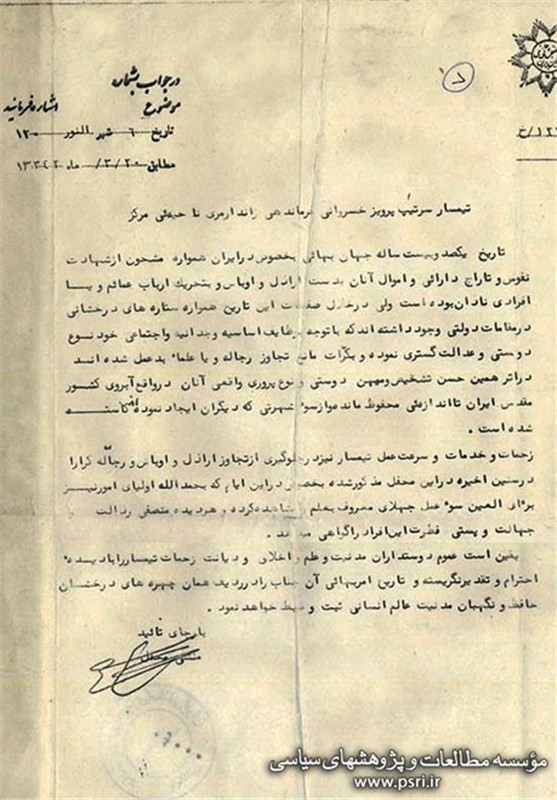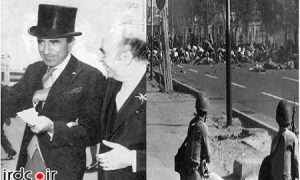Based on the available evidence and documents, the deviant cult of Baha’ism played an effective role in suppressing the protesters and killing the people of Iran in the days ending on Khordad 15, 1342 S.H., with its influence on the Pahlavi regime
Based on the available evidence and documents, the deviant cult of Baha’ism played an effective role in suppressing and killing people on this day with its influence on the Pahlavi regime in the days ending on Khordad 15, 1342 S.H.
With the departure of Ayatollah Boroujerdi, who had taken significant steps in the fight against the deviant cult of Bahaism, the Shia clergymen continued to put the fight against this cult on their agenda under the leadership of Imam Khomeini (P.H.). Since the years 1341 to 1343 S.H., Imam Khomeini (P.H.) always and at different times attacked the Baha’is as the agents of Zionism in Iran. The most important revelations of Imam Khomeini (P.H.) against this misguided cult were in the evening of Ashura in 1342. Therefore, the enmity of this misguided cult with Imam Khomeini’s movement was increasing day by day. So that they supported the killing of people by the Pahlavi regime. The following examples show the role of the Baha’is in killing people in the 15 Khordad.
The role of the deviant cult of Baha’ism in the execution of the martyrs of the fifteenth of Khordad
After Khordad 15 uprising, the Pahlavi regime made widespread arrests. Meantime, Haj Esmail Rezaei and Tayeb Haj Rezaei were among the people who were finally handed over to the execution squad. It should be mentioned that these two people were present in the anti-Baha’i campaigns that were being pursued by scholars at that time due to their close relationship with the Shiite clergy centered on Ayatollah Borujerdi especially since the mid 30s.
During the peak campaign against Baha’ism, Tayyab Haj Reza’i destroyed “Golestan Javid”, a Baha’i cemetery located in Mesghar Abad area along with some others. Haj Ismail Rezaei also played a significant role in undermining this misguided cult by establishing a mosque called “Sahib Al-Zaman (AS) Mosque” right in front of the “Pepsi Cola” company belonged to the Baha’is. Based on this, the grounds of Baha’i hostility towards these two were formed.
In fact, because Tayyab Haj Reza’i and Haj Ismail Reza’i played an effective role in the fight against Baha’ism under the teachings of the seminary, they became the main enemies of this cult. As it is said, after the execution of Tayeb and Haj Ismail, even the Baha’is celebrated by holding a celebration. Also, as it was revealed later, a Baha’i capitalist named “Habibullah Sabet Pasal”, as well as “Eyadi”, the king’s special physician, played a role in the execution of the two. So that Sabet Pasal had demanded their execution in a meeting with Mohammad Reza Shah.
In this regard, Hossein Shah Hosseini believes: “One of the reasons for the execution of Haj Ismail and Tayyeb was their opposition to Baha’ism. In fact, this became the source of the hatred of the Baha’is who had influence on the government.” Tayyab Haj Reza’i’s son also believes that Tayyab’s campaigns against the Baha’is caused to revenge, so that Ayadi, the special physician of Shah and one of the country’s Baha’i capitalists called Habibullah Sabit Pasal were responsible for the execution of Tayyab.
Supporting the suppression of the people in the Khordad 15 uprising by the Baha’is
In addition to the previously mentioned cases, the existing documents indicate the sympathy and companionship of the Baha’i cult with the government of Asadullah Alam in killing people on 15 Khordad 1342 S.H.; so that after the suppression of the popular uprising on this day, the Baha’is officially announced that supporting the killing of protestors on 15 of Khordad and also the attack on the Feiziyeh school in Qom was their response to the destruction of “Hadhiratul Quds”.
Additionally, the secretary of the Baha’i community wrote a letter on 20 Khordad 42 and only five days after the bloody suppression of the uprising on 15 Khordad of that year to Parviz Khosravani (a member of fanatical Baha’is and the administrator of a Baha’i assembly at the level of ministers) during the time when he was the commander of the Gendarmerie of Tehran and insulted the people of Iran and the clerics, and implicitly supported his role in suppressing this uprising. It is stated In a part of this message of appreciation:
“General Parviz Khosravani; Central District Gendarmerie Commander
The 120-year history of the Baha’i world, especially in Iran, has always been full of martyrdom and looting of their property by thugs and mobs and at the instigation of turban lords or ignorant people. But during the pages of this history, there have always been bright stars among the governmental officials who have expanded philanthropy and justice according to their basic, conscientious and social duties and have repeatedly prevented ill-behaved scholars.”
In the continuation of this letter, it is stated about the events of Khordad 15th : “The efforts and services and speed of action of General in preventing the encroachment of thugs and mobs have been repeatedly mentioned in this assembly in recent years, especially in these recent days when, thanks God, the guardians of affairs have also observed the misdeeds of ignorant people known to science, and any fair eye can testify to the vileness, ignorance, and baseness of these people’s nature. It is certain that the people who love civility, science, ethics and religion will look at the General’s efforts with respect and appreciation, and the history of the Baha’ism will record that Excellency in the ranks of the same shining faces of the protectors and guardians of the civility of the human world.”
At the same time, after the events of 15th of Khordad, “Akhbar Amri” publication, the official organ of Baha’i centralism in Iran, supported the Pahlavi regime and suppressing the Muslim people of Iran by including a report on these events and called the protesters a bunch of thugs.

Increasing the influence of the Baha’is after the 15th of Khordad uprising
After the brutal suppression of the 15th of Khordad uprising, the influence of the Baha’is on the court increased, so that they were being employed in governmental institutions openly and without any hesitation. During the time when Hoyda was the prime minister, the Baha’is were employed in sensitive centers of the country more than ever before. The following Baha’i figures gained influence in various political and economic sectors of the country after the suppression of the 15th of Khordad uprising: “Hojabr Yazdani” the capitalist, “Sabet Pasal”, the head of Radio and Television, “Farokhrou Parsa”, the Minister of Education, Shahqoli, the minister of health, Ayadi, the special physician of Mohammad Reza Pahlavi, and Parviz Sabeti, deputy director of SAVAK.






